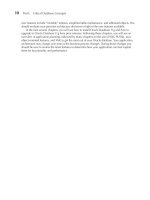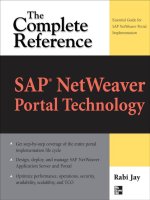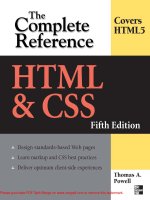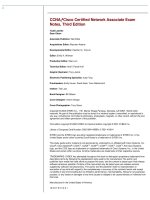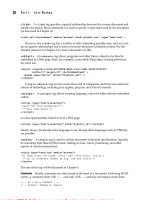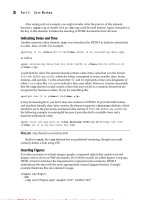C++: The Complete Reference Third Edition docx
Bạn đang xem bản rút gọn của tài liệu. Xem và tải ngay bản đầy đủ của tài liệu tại đây (8.77 MB, 1,041 trang )
C++:
The Complete Reference
Third Edition
About the Author…
Herb Schildt is the leading authority on C and
C++ and a best-selling author whose books
have sold more than 1.5 million copies. His
acclaimed C and C++books include Teach
Yourself C, C++ from the Ground Up, Teach
Yourself C++, C++: The Complete Reference,
Borland C++: The Complete Reference, and C++
Programmer's Reference to name a few.
C++:
The Complete Reference
Third Edition
Herbert Schildt
Osborne McGraw-Hill
Berkeley New York St. Louis San Francisco
Auckland Bogotá Hamburg London Madrid
Mexico City Milan Montreal New Delhi Panama City
Paris São Paulo Singapore Sydney
Tokyo Toronto
Copyright © 1998 by McGraw-Hill Companies. All rights reserved. Manufactured in the United States of America. Except as permitted
under the United States Copyright Act of 1976, no part of this publication may be reproduced or distributed in any form or by any means,
or stored in a database or retrieval system, without the prior written permission of the publisher.
0-07-213293-0
The material in this eBook also appears in the print version of this title: 0-07-882476-1
All trademarks are trademarks of their respective owners. Rather than put a trademark symbol after every occurrence of a trademarked
name, we use names in an editorial fashion only, and to the benefit of the trademark owner, with no intention of infringement of the
trademark. Where such designations appear in this book, they have been printed with initial caps.
McGraw-Hill eBooks are available at special quantity discounts to use as premiums and sales promotions, or for use in corporate train-
ing programs. For more information, please contact George Hoare, Special Sales, at or (212) 904-
4069.
TERMS OF USE
This is a copyrighted work and The McGraw-Hill Companies, Inc. (“McGraw-Hill”) and its licensors reserve all rights in and to the
work. Use of this work is subject to these terms. Except as permitted under the Copyright Act of 1976 and the right to store and retrieve
one copy of the work, you may not decompile, disassemble, reverse engineer, reproduce, modify, create derivative works based upon,
transmit, distribute, disseminate, sell, publish or sublicense the work or any part of it without McGraw-Hill’s prior consent. You may
use the work for your own noncommercial and personal use; any other use of the work is strictly prohibited. Your right to use the work
may be terminated if you fail to comply with these terms.
THE WORK IS PROVIDED “AS IS”. McGRAW-HILLAND ITS LICENSORS MAKE NO GUARANTEES OR WARRANTIES AS
TO THE ACCURACY, ADEQUACY OR COMPLETENESS OF OR RESULTS TO BE OBTAINED FROM USING THE WORK,
INCLUDING ANY INFORMATION THAT CAN BE ACCESSED THROUGH THE WORK VIA HYPERLINK OR OTHERWISE,
AND EXPRESSLY DISCLAIM ANY WARRANTY, EXPRESS OR IMPLIED, INCLUDING BUT NOT LIMITED TO IMPLIED
WARRANTIES OF MERCHANTABILITY OR FITNESS FOR A PARTICULAR PURPOSE. McGraw-Hill and its licensors do not
warrant or guarantee that the functions contained in the work will meet your requirements or that its operation will be uninterrupted or
error free. Neither McGraw-Hill nor its licensors shall be liable to you or anyone else for any inaccuracy, error or omission, regardless
of cause, in the work or for any damages resulting therefrom. McGraw-Hill has no responsibility for the content of any information
accessed through the work. Under no circumstances shall McGraw-Hill and/or its licensors be liable for any indirect, incidental, spe-
cial, punitive, consequential or similar damages that result from the use of or inability to use the work, even if any of them has been
advised of the possibility of such damages. This limitation of liability shall apply to any claim or cause whatsoever whether such claim
or cause arises in contract, tort or otherwise.
DOI: 10.1036/0072132930
abc
McGraw-Hill
Contents at a Glance
Part I The Foundation of C++: The C Subset
1 An Overview of C 3
2 Expressions 13
3 Statements 57
4 Arrays and Null-Terminated Strings 89
5 Pointers 113
6 Functions 137
7 Structures, Unions, Enumerations, and User-
Defined Types 161
8 C-Style Console I/O 187
9 File I/O 211
10 The Preprocessor and Comments 237
Part II C++
11 An Overview of C++ 255
12 Classes and Objects 289
13 Arrays, Pointers, References and the Dynamic
Allocation Operators 327
14 Function Overloading, Copy Constructors,
and Default Arguments 361
15 Operator Overloading 385
v
16 Inheritance 419
17 Virtual Functions and Polymorphism 445
18 Templates 461
19 Exception Handling 489
20 C++ I/O System Basics 511
21 C++ File I/O 541
22 Run-Time Type ID and the Casting Operators 569
23 Namespaces, Conversion Functions,and Other
Advanced Topics 593
24 Introducing the Standard Template Library 625
Part III The Standard Function Library
25 The C-Based I/O Functions 695
26 The String and Character Functions 719
27 The Mathematical Functions 733
28 Time, Date, and Localization Functions 743
29 The Dynamic Allocation Functions 753
30 Utility Functions 757
31 The Wide-Character Functions 771
Part IV The Standard C++ Class Library
32 The Standard C++ I/O Classes 783
33 The STL Container Classes 807
34 The STL Algorithms 835
35 STL Iterators, Allocators, and Function Objects 857
36 The String Class 877
37 The Numeric Classes 893
38 Exception Handling and Miscellaneous Classes 921
Part V Applying C++
39 Integrating New Classes: A Custom String Class 931
40 An Object-Oriented Expression Parser 959
Index 995
vi
C++: The Complete Reference
Contents
Preface xxix
Part I
The Foundation of C++: The C Subset
1 An Overview of C 3
The Origins of C 4
C Is a Middle-Level Language 4
C Is a Structured Language 6
C Is a Programmer's Language 8
The Form of a C Program 9
The Library and Linking 10
Separate Compilation 12
Understanding the .C and .CPP File Extensions 12
2 Expressions 13
The Five Basic Data Types 14
vii
Modifying the Basic Types 15
Identifier Names 16
Variables 17
Where Variables Are Declared 17
Local Variables 17
Formal Parameters 21
Global Variables 21
Access Modifiers 23
const 23
volatile 24
Storage Class Specifiers 25
extern 25
static Variables 27
register Variables 29
Variable Initializations 31
Constants 31
Hexadecimal and Octal Constants 32
String Constants 33
Backslash Character Constants 33
Operators 34
The Assignment Operator 34
Type Conversion in Assignments 35
Multiple Assignments 36
Arithmetic Operators 37
Increment and Decrement 37
Relational and Logical Operators 39
Bitwise Operators 42
The ? Operator 47
The & and * Pointer Operators 47
The Compile-Time Operator sizeof 49
The Comma Operator 50
The Dot (.) and Arrow (−>) Operators 51
The [ ] and ( ) Operators 51
Precedence Summary 52
Expressions 53
Order of Evaluation 53
Type Conversion in Expressions 53
Casts 54
Spacing and Parentheses 55
Shorthand Assignments 56
3 Statements 57
True and False in C and C++ 58
viii
C++: The Complete Reference
Selection Statements 59
if 59
Nested ifs 60
The if-else-if Ladder 62
The ? Alternative 63
The Conditional Expression 66
switch 67
Nested switch Statements 70
Iteration Statements 70
The for Loop 70
for Loop Variations 72
The Infinite Loop 76
for Loops with No Bodies 77
The while Loop 77
The do-while Loop 79
Declaring Variables within Selection and Iteration Statements . . . 81
Jump Statements 82
The return Statement 82
The goto Statement 83
The break Statement 83
The exit( ) Function 85
The continue Statement 86
Expression Statements 88
Block Statements 88
4 Arrays and Null-Terminated Strings 89
Single-Dimension Arrays 90
Generating a Pointer to an Array 92
Passing Single-Dimension Arrays to Functions 92
Null-Terminated Strings 94
Two-Dimensional Arrays 96
Arrays of Strings 100
Multidimensional Arrays 101
Indexing Pointers 102
Array Initialization 105
Unsized Array Initializations 106
A Tic-Tac-Toe Example 108
5 Pointers 113
What Are Pointers? 114
Pointer Variables 115
The Pointer Operators 115
Pointer Expressions 116
Contents
ix
Pointer Assignments 117
Pointer Arithmetic 117
Pointer Comparisons 119
Pointers and Arrays 120
Arrays of Pointers 122
Multiple Indirection 123
Initializing Pointers 124
Pointers to Functions 126
C's Dynamic Allocation Functions 129
Problems with Pointers 131
6 Functions 137
The General Form of a Function 138
Scope Rules of Functions 138
Function Arguments 139
Call by Value, Call by Reference 139
Creating a Call by Reference 140
Calling Functions with Arrays 142
argc and argv—Arguments to main( ) 144
The return Statement 147
Returning from a Function 147
Returning Values 149
Returning Pointers 151
Functions of Type void 152
What Does main( ) Return? 153
Recursion 153
Function Prototypes 155
Standard Library Function Prototypes 157
Declaring Variable-Length Parameter Lists 158
Old-Style Versus Modern Function Parameter Declarations 158
Implementation Issues 159
Parameters and General-Purpose Functions 159
Efficiency 159
7 Structures, Unions, Enumerations, and User-
Defined Types 161
Structures 162
Accessing Structure Members 165
Structure Assignments 165
Arrays of Structures 166
Passing Structures to Functions 166
Passing Structure Members to Functions 167
Passing Entire Structures to Functions 167
x
C++: The Complete Reference
Structure Pointers 169
Declaring a Structure Pointer 170
Using Structure Pointers 170
Arrays and Structures Within Structures 173
Bit-Fields 174
Unions 176
Enumerations 180
Using sizeof to Ensure Portability 183
typedef 184
8 C-Style Console I/O 187
An Important Application Note 188
Reading and Writing Characters 189
A Problem with getchar( ) 190
Alternatives to getchar( ) 190
Reading and Writing Strings 192
Formatted Console I/O 195
printf( ) 195
Printing Characters 196
Printing Numbers 196
Displaying an Address 198
The %n Specifier 198
Format Modifiers 199
The Minimum Field Width Specifier 199
The Precision Specifier 200
Justifying Output 201
Handling Other Data Types 202
The * and # Modifiers 202
scanf( ) 203
Format Specifiers 203
Inputting Numbers 203
Inputting Unsigned Integers 205
Reading Individual Characters Using scanf( ) 205
Reading Strings 205
Inputting an Address 206
The %n Specifier 206
Using a Scanset 206
Discarding Unwanted White Space 207
Non-White-Space Characters in the Control String 208
You Must Pass scanf( ) Addresses 208
Format Modifiers 208
Suppressing Input 209
Contents
xi
9 File I/O 211
C Versus C++ File I/O 212
Streams and Files 212
Streams 212
Text Streams 213
Binary Streams 213
Files 213
File System Basics 214
The File Pointer 215
Opening a File 215
Closing a File 217
Writing a Character 218
Reading a Character 218
Using fopen( ), getc( ), putc( ), and fclose( ) 218
Using feof( ) 220
Working with Strings: fputs( ) and fgets( ) 222
rewind( ) 223
ferror( ) 224
Erasing Files 226
Flushing a Stream 227
fread( ) and fwrite( ) 227
Using fread( ) and fwrite( ) 228
fseek( ) and Random-Access I/O 229
fprintf( ) and fscanf( ) 231
The Standard Streams 232
The Console I/O Connection 234
Using freopen( ) to Redirect the Standard Streams 235
10 The Preprocessor and Comments 237
The Preprocessor 238
#define 238
Defining Function-like Macros 240
#error 241
#include 242
Conditional Compilation Directives 242
#if, #else, #elif, and #endif 243
#ifdef and #ifndef 245
#undef 246
Using defined 247
#line 248
#pragma 248
The # and ## Preprocessor Operators 248
Predefined Macro Names 250
xii
C++: The Complete Reference
C-Style Comments 250
Par t II
C++
11 An Overview of C++ 255
The Origins of C++ 256
What Is Object-Oriented Programming? 257
Encapsulation 258
Polymorphism 258
Inheritance 259
Some C++ Fundamentals 259
A Sample C++ Program 260
A Closer Look at the I/O Operators 263
Declaring Local Variables 264
No Default to int 265
The bool Data Type 266
Old-Style vs. Modern C++ 266
The New C++ Headers 268
Namespaces 269
Working with an Old Compiler 270
Introducing C++ Classes 270
Function Overloading 274
Operator Overloading 278
Inheritance 278
Constructors and Destructors 283
The C++ Keywords 287
The General Form of a C++ Program 288
12 Classes and Objects 289
Classes 290
Structures and Classes Are Related 293
Unions and Classes Are Related 295
Anonymous Unions 297
Friend Functions 298
Friend Classes 302
Inline Functions 303
Defining Inline Functions Within a Class 306
Parameterized Constructors 307
Constructors with One Parameter: A Special Case 309
Static Class Members 310
Static Data Members 310
Contents
xiii
Static Member Functions 315
When Constructors and Destructors Are Executed 317
The Scope Resolution Operator 319
Nested Classes 320
Local Classes 320
Passing Objects to Functions 321
Returning Objects 323
Object Assignment 324
13 Arrays, Pointers, References, and the Dynamic Allocation
Operators 327
Arrays of Objects 328
Creating Initialized vs. Uninitialized Arrays 330
Pointers to Objects 331
Type Checking C++ Pointers 333
The this Pointer 334
Pointers to Derived Types 336
Pointers to Class Members 339
References 341
Reference Parameters 341
Passing References to Objects 345
Returning References 346
Independent References 347
References to Derived Types 348
Restrictions to References 349
A Matter of Style 349
C++'s Dynamic Allocation Operators 349
Initializing Allocated Memory 351
Allocating Arrays 352
Allocating Objects 353
The nothrow Alternative 358
The Placement Forms of new and delete 359
14 Function Overloading, Copy Constructors, and Default
Arguments 361
Function Overloading 362
Overloading Constructor Functions 364
Overloading a Constructor to Gain Flexibility 364
Allowing Both Initialized and Uninitialized Objects 366
Copy Constructors 368
Finding the Address of an Overloaded Function 372
The overload Anachronism 373
xiv
C++: The Complete Reference
Default Function Arguments 374
Default Arguments vs. Overloading 378
Using Default Arguments Correctly 380
Function Overloading and Ambiguity 380
15 Operator Overloading 385
Creating a Member Operator Function 386
Creating Prefix and Postfix Forms of the
Increment and Decrement Operators 391
Overloading the Shorthand Operators 392
Operator Overloading Restrictions 392
Operator Overloading Using a Friend Function 393
Using a Friend to Overload ++ or – – 395
Friend Operator Functions Add Flexibility 398
Overloading new and delete 400
Overloading new and delete for Arrays 405
Overloading the nothrow Version of new and delete 408
Overloading Some Special Operators 409
Overloading [ ] 409
Overloading ( ) 413
Overloading –> 415
Overloading the Comma Operator 416
16 Inheritance 419
Base-Class Access Control 420
Inheritance and protected Members 422
Protected Base-Class Inheritance 426
Inheriting Multiple Base Classes 427
Constructors, Destructors, and Inheritance 428
When Constructor and Destructor
Functions Are Executed 428
Passing Parameters to Base-Class Constructors 432
Granting Access 436
Virtual Base Classes 439
17 Virtual Functions and Polymorphism 445
Virtual Functions 446
Calling a Virtual Function Through a Base Class
Reference 449
The Virtual Attribute Is Inherited 450
Virtual Functions Are Hierarchical 452
Pure Virtual Functions 455
Abstract Classes 457
Contents
xv
Using Virtual Functions 457
Early vs. Late Binding 460
18 Templates 461
Generic Functions 462
A Function with Two Generic Types 465
Explicitly Overloading a Generic Function 465
Overloading a Function Template 468
Using Standard Parameters with Template Functions . . . 468
Generic Function Restrictions 469
Applying Generic Functions 470
A Generic Sort 471
Compacting an Array 472
Generic Classes 474
An Example with Two Generic Data Types 478
Applying Template Classes: A Generic Array Class 479
Using Non-Type Arguments with Generic Classes 481
Using Default Arguments with Template Classes 483
Explicit Class Specializations 485
The typename and export Keywords 486
The Power of Templates 487
19 Exception Handling 489
Exception Handling Fundamentals 490
Catching Class Types 496
Using Multiple catch Statements 497
Handling Derived-Class Exceptions 499
Exception Handling Options 500
Catching All Exceptions 500
Restricting Exceptions 502
Rethrowing an Exception 504
Understanding terminate( ) and unexpected( ) 505
Setting the Terminate and Unexpected Handlers 506
The uncaught_exception( ) Function 507
The exception and bad_exception Classes 508
Applying Exception Handling 508
20 The C++ I/O System Basics 511
Old vs. Modern C++ I/O 512
C++ Streams 513
The C++ Stream Classes 513
C++'s Predefined Streams 514
Formatted I/O 515
xvi
C++: The Complete Reference
Formatting Using the ios Members 515
Setting the Format Flags 516
Clearing Format Flags 517
An Overloaded Form of setf( ) 518
Examining the Formatting Flags 520
Setting All Flags 521
Using width( ), precision( ), and fill( ) 522
Using Manipulators to Format I/O 524
Overloading << and >> 528
Creating Your Own Inserters 528
Creating Your Own Extractors 534
Creating Your Own Manipulator Functions 537
21 C++ File I/O 541
<fstream> and the File Classes 542
Opening and Closing a File 542
Reading and Writing Text Files 545
Unformatted and Binary I/O 547
Characters vs. Bytes 547
put( ) and get( ) 548
read( ) and write( ) 550
More get( ) Functions 553
getline( ) 553
Detecting EOF 555
The ignore( ) Function 557
peek( ) and putback( ) 558
flush( ) 558
Random Access 559
Obtaining the Current File Position 563
I/O Status 563
Customized I/O and Files 565
22 Run-Time Type ID and the Casting Operators 569
Run-Time Type Identification (RTTI) 570
A Simple Application of Run-Time Type ID 576
typeid Can Be Applied to Template Classes 578
The Casting Operators 580
dynamic_cast 580
Replacing typeid with dynamic_cast 584
Using dynamic_cast with Template Classes 586
const_cast 588
static_cast 590
reinterpret_cast 590
Contents
xvii
23 Namespaces, Conversion Functions,
and Other Advanced Topics 593
Namespaces 594
Namespace Fundamentals 594
using 598
Unnamed Namespaces 600
Some Namespace Options 601
The std Namespace 603
Creating Conversion Functions 605
const Member Functions and mutable 609
Volatile Member Functions 611
Explicit Constructors 612
Using the asm Keyword 613
Linkage Specification 614
Array-Based I/O 615
The Array-Based Classes 616
Creating an Array-Based Output Stream 616
Using an Array as Input 618
Input/Output Array-Based Streams 620
Using Dynamic Arrays 621
Using Binary I/O with Array-Based Streams 622
Summarizing the Differences
Between C and C++ 623
24 Introducing the Standard Template Library 625
An Overview of the STL 626
Containers 626
Algorithms 627
Iterators 627
Other STL Elements 628
The Container Classes 629
General Theory of Operation 630
Vectors 631
Accessing a Vector Through an Iterator 635
Inserting and Deleting Elements in a Vector 637
Storing Class Objects in a Vector 639
Lists 641
Understanding end( ) 645
push_front( ) vs push_back( ) 647
Sort a List 648
Merging One List with Another 649
Storing Class Objects in a List 651
Maps 654
xviii
C++: The Complete Reference
Storing Class Objects In a Map 658
Algorithms 660
Counting 660
Removing and Replacing Elements 666
Reversing a Sequence 668
Transforming a Sequence 669
Using Function Objects 671
Unary and Binary Function Objects 671
Using the Built-in Function Objects 671
Creating a Function Object 674
Using Binders 676
The string Class 679
Some string Member Functions 683
Strings Are Containers 689
Putting Strings into Other Containers 690
Final Thoughts on the STL 691
Part III
The Standard Function Library
25 The C-Based I/O Functions 695
clearerr 696
fclose 697
feof 697
ferror 697
fflush 698
fgetc 698
fgetpos 698
fgets 699
fopen 699
fprintf 701
fputc 701
fputs 702
fread 702
freopen 702
fscanf 703
fseek 703
fsetpos 704
ftell 704
fwrite 705
getc 705
getchar 706
gets 706
Contents
xix
perror 706
printf 707
putc 710
putchar 710
puts 710
remove 711
rename 711
rewind 711
scanf 711
setbuf 715
setvbuf 715
sprintf 716
sscanf 716
tmpfile 716
tmpnam 717
ungetc 717
vprintf, vfprintf, and vsprintf 718
26 The String and Character Functions 719
isalnum 720
isalpha 720
iscntrl 721
isdigit 721
isgraph 721
islower 721
isprint 722
ispunct 722
isspace 722
isupper 723
isxdigit 723
memchr 723
memcmp 723
memcpy 724
memmove 724
memset 725
strcat 725
strchr 725
strcmp 726
strcoll 726
strcpy 727
strcspn 727
strerror 727
strlen 727
xx
C++: The Complete Reference
strncat 728
strncmp 728
strncpy 729
strpbrk 729
strrchr 729
strspn 730
strstr 730
strtok 730
strxfrm 731
tolower 731
toupper 731
27 The Mathematical Functions 733
acos 734
asin 734
atan 735
atan2 735
ceil 735
cos 736
cosh 736
exp 736
fabs 737
floor 737
fmod 737
frexp 737
ldexp 738
log 738
log10 738
modf 739
pow 739
sin 739
sinh 740
sqrt 740
tan 740
tanh 741
28 Time, Date, and Localization Functions 743
asctime 744
clock 745
ctime 745
difftime 746
gmtime 746
localeconv 746
Contents
xxi
localtime 748
mktime 748
setlocale 748
strftime 749
time 750
29 The Dynamic Allocation Functions 753
calloc 754
free 754
malloc 755
realloc 755
30 Utility Functions 757
abort 758
abs 758
assert 759
atexit 759
atof 759
atoi 760
atol 760
bsearch 760
div 761
exit 762
getenv 762
labs 762
ldiv 763
longjmp 763
mblen 763
mbstowcs 764
mbtowc 764
qsort 764
raise 765
rand 766
setjmp 766
signal 766
srand 767
strtod 767
strtol 768
strtoul 768
system 769
va_arg, va_start, and va_end 769
wcstombs 770
wctomb 770
xxii
C++: The Complete Reference
31 The Wide-Character Functions 771
The Wide-Character Classification Functions 772
The Wide-Character I/O Functions 775
The Wide-Character String Functions 775
Wide-Character String Conversion Functions 775
Wide-Character Array Functions 778
Multibyte/Wide-Character Conversion Functions 779
Part IV
The Standard C++ Class Library
32 The Standard C++ I/O Classes 783
The I/O Classes 784
The I/O Headers 786
The Format Flags and I/O Manipulators 787
Several Data Types 789
The streamsize and streamoff Types 789
The streampos and wstreampos Types 789
The pos_type and off_type Types 789
The openmode Type 789
The iostate Type 790
The seekdir type 790
The failure Class 790
Overload << and >> Operators 790
The General-Purpose I/O Functions 791
bad 791
clear 791
eof 791
exceptions 792
fail 792
fill 792
flags 793
flush 793
fstream, ifstream, and ofstream 793
gcount 794
get 794
getline 795
good 796
ignore 796
open 796
peek 797
precision 798
Contents
xxiii
put 798
putback 798
rdstate 798
read 799
readsome 799
seekg and seekp 800
setf 801
setstate 801
str 802
stringstream, istringstream, ostringstream 802
sync_with_stdio 803
tellg and tellp 804
unsetf 804
width 804
write 805
33 The STL Container Classes 807
The Container Classes 808
bitset 810
deque 812
list 815
map 818
multimap 820
multiset 823
queue 825
priority_queue 826
set 827
stack 829
vector 830
34 The STL Algorithms 835
adjacent_find 836
binary_search 836
copy 837
copy_backward 837
count 837
count_if 838
equal 838
equal_range 838
fill and fill_n 839
find 839
find_end 839
find_first_of 839
xxiv
C++: The Complete Reference


